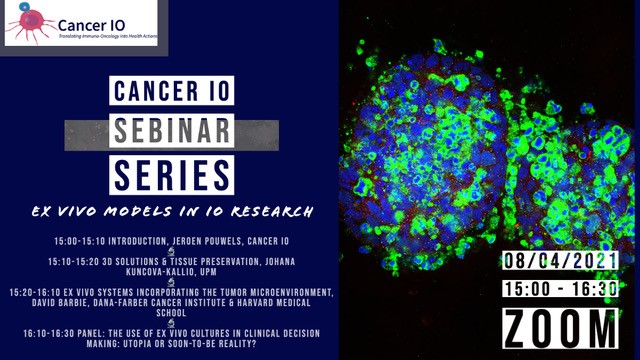Welcome to the “Ex vivo models in immuno-oncology research” sebinar on 8 April 2021 at 15.00-16.30!
Cancer IO project, coordinated by the University of Helsinki, is starting a bi-monthly sebinar (webinar + seminar) series in April 2021. The first session focuses on Ex vivo models in immuno-oncology research. Welcome to join the event on in Zoom. Programme and more information below and on Cancer IO’s website & LinkedIn.
Cancer IO Sebinar Series Session I: Ex vivo models in immuno-oncology research
08.04.2021, 15:00-16:30 (Helsinki time), Zoom event
This interactive bi-monthly sebinar (seminar + webinar) series aims to bring you the newest developments in the field of immuno-oncology presented by leading scientists. Every sebinar will have an important interactive element in the form of a panel discussion, where the invited speaker discusses a timely topic with local scientists and clinicians. Sebinar attendants are welcomed to participate in the discussion using the Q&A feature.
In the first edition of the Cancer IO Sebinar series (Thursday 8.4.2021; 15.00-16.30) we will hear about the latest development of patient-derived ex vivo models in an immuno-oncology setting, and discuss about the possible future use of these models in clinical decision making. Our invited speakers and panelists are Dr David Barbie from Dana-Farber Cancer Institute & Harvard Medical School (biography below), Johana Kuncova-Kallio from UPM Biomedicals, Peeter Karihtala from Helsinki University Hospital and Jeroen Pouwels from University of Helsinki.
Program:
15:00 – 15:10 Introduction to ex vivo models, Jeroen Pouwels / Research Coordinator in Cancer IO
15:10 – 15:20 3D Solutions & tissue preservation, Johana Kuncova-Kallio / Director in UPM Biomedicals
15:20 – 16:10 Ex vivo systems incorporating the tumor microenvironment, Dr. David Barbie / Assistant Professor in Dana-Farber Cancer Institute & Harvard Medical School
16:10 – 16:30 Panel discussion: The use of ex vivo cultures in clinical decision making: Utopia or soon-to-be reality?
Panelists: David Barbie, Johana Kuncova-Kallio, Jeroen Pouwels and Research Director Peeter Karihtala, Helsinki University Hospital
Session Chair: Heidi Haikala, Cancer IO & Dana-Farber Cancer Institute
Biography for Dr. David Barbie:
Dr. David A. Barbie is an Assistant Professor of Medicine at Harvard Medical School and Thoracic Oncologist at the Dana-Farber Cancer Institute, and an Associate Director of the Belfer Center for Science and International Affairs. He obtained an A.B. from Harvard College in 1997 and M.D. from Harvard Medical School in 2002. Dr. Barbie was an HHMI Medical Fellow from 1999-2000 between his 2nd and 3rd years of medical school, working in Dr. Ed Harlow’s lab at Massachusetts General Hospital. He completed his residency in internal medicine at Massachusetts General Hospital in 2005, followed by a year as medical chief resident in 2006. Dr. Barbie was a medical oncology fellow in the Dana-Farber/Partners CancerCare program, which he completed in 2008. Following a post-doctoral fellowship in Dr. William Hahn’s lab at the Broad Institute, he received a tenure-track independent investigator position in 2010 at Dana-Farber, and a clinical position within the Lowe Center for Thoracic Oncology.
Recent selected publications:
Dynamic single-cell RNA sequencing identifies immunotherapy persister cells following PD-1 blockade. J Clin Invest. 2021
Tumor-Derived cGAMP Regulates Activation of the Vasculature. Front Immunol. 2020
Inactivation of Fbxw7 Impairs dsRNA Sensing and Confers Resistance to PD-1 Blockade. Cancer Discov. 2020
TBK1 Activation by VHL Loss in Renal Cell Carcinoma: A Novel HIF-Independent Vulnerability. Cancer Discov. 2020
Use of Ex Vivo Patient-Derived Tumor Organotypic Spheroids to Identify Combination Therapies for HER2 Mutant Non-Small Cell Lung Cancer. Clin Cancer Res. 2020
Engineering approaches for studying immune-tumor cell interactions and immunotherapy. iScience. 2020
Suppression of STING Associated with LKB1 Loss in KRAS-Driven Lung Cancer. Cancer Discov. 2019
Defining T Cell States Associated with Response to Checkpoint Immunotherapy in Melanoma. Cell. 2018
A Cancer Cell Program Promotes T Cell Exclusion and Resistance to Checkpoint Blockade. Cell. 2018
Ex Vivo Profiling of PD-1 Blockade Using Organotypic Tumor Spheroids. Cancer Discov. 2018 Feb;8(2):196-215. doi: 10.1158/2159-8290.CD-17-0833. Epub 2017 Nov 3.PMID: 29101162
Full publication list:

